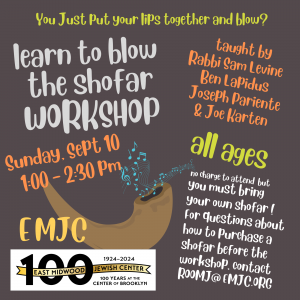August 18, 2023
Today is Rosh Chodesh Elul, the beginning of the final month of the Jewish Year. I hope you had a chance to read Cantor Julia’s meaningful reflection on Elul and the Holy Days (it went out yesterday). She writes beautifully about the “process and… practice of touching, again and again, the spots in our lives where we long to reflect, consider new pathways, repair relationships, prioritize, and seek out the divine.” Cantor Julia gets straight to the spirit of the month; Elul is meant to be a time of deep introspection, a period of soul-searching in anticipation of the upcoming High Holy Days. We pray, we study, we give tzedakah, we meditate on our behavior over the past year. Ideally, we ask forgiveness from those we feel we have wronged. Of course, all of this is meant to set us up for a new start; when Tishrei brings in Rosh Hashana and we are cast into the intensity of the Ten Days of Repentance, much of the heavy lifting has already been done, and we can really concentrate on setting our spiritual ship right. From a certain point of view, the High Holy Days have begun.
At EMJC, there is a scurry of activity preparing for the Holy Days. The lay leadership, a troupe of volunteers, the professional staff, and the custodial staff, are all going about their Elul business, swabbing the decks (as it were) and getting ready for our collective spiritual voyage. Starting yesterday, with the beginning of Elul, the shofar is sounded every morning of this month (except Shabbat and the final day), doing what the shofar does: awakening us to the need to repent; recalling for us the merit of our ancestors; reminding us that, in the words of Isaiah, our sins, “like crimson… like dyed wool… can turn snow-white… can become like fleece.”
But let’s extend the meaning to a more local purpose: the shofar is also reminding us of EMJC Elul programming! Here’s what’s in store for the coming month:
The Elul Sessions
Aug. 30, Sep. 6, Sep. 13
Join Cantor Julia and me for an exploration of the themes of the High Holy Days. I will be presenting two sessions on the liturgy of Rosh Hashana and Yom Kippur, delving into the background and deeper meaning of some of the key components of the High Holy Day prayers. Cantor Julia will explore High Holy Day themes through other media in a special Elul session. Keep an eye out for details.

S’lichot Across Brooklyn
Sep. 9
As has been our practice over the last few years, we will join together with a host of congregations and communities from across the borough to recite s’lichot – special penitential prayers that launch the liturgy of the season. This will take place at Park Slope Jewish Center on Saturday night, after Shabbat (the event will be hybrid – stay tuned for times and links). I will be participating alongside many of my Brooklyn colleagues, rabbinical and cantorial. It’s a very moving night of reflection and song.
EMJC is also co-sponsoring a special live event in Gowanus that night. Immediately after Shabbat ends, the extraordinary Galit Dardashti (of Divahn) will be performing Monajat, a re-imagining of the Persian S’lichot prayers, featuring the voice of her late grandfather, Yona Dardashti, one of the great classical singers of Iran, who himself was a chazzan/cantor.

Shofar Blowing Workshop!
Sep. 10
You may have gotten wind of this: we are encouraging anyone interested to purchase a shofar (they’re surprisingly affordable) and come to this special session to learn how to become a ba’al/ba’alat tekiya – a shofar blower! We have an expert staff lined up to help you learn this exceptional skill. We’ll talk about the shofar and learn the intricacies of the blasts. If you’re thinking, what’s the big deal? You just put your lips together and blow, then you’ll be surprised. You’ll see more announcements about this one too – sign up! Get on the horn and make your reservation. Don’t blow it!
As the summer winds down and we begin gearing up for the fall, with all of its fresh beginnings, let me wish you a fruitful, introspective Elul, and a –
Shabbat shalom um’vorach – a peaceful and blessed Shabbat.
Rabbi Sam Levine